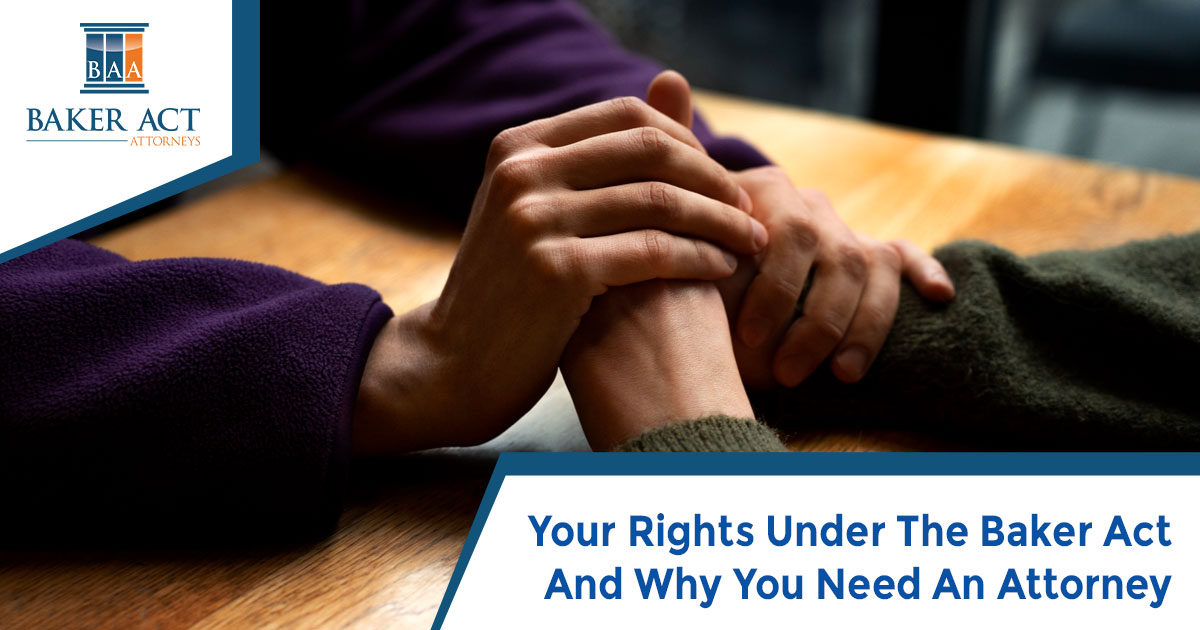The Baker Act is the centerpiece of Florida’s mental healthcare framework. It was enacted in 1972 with the objective of securing the rights of those undergoing involuntary mental health treatment in Florida’s psychiatric facilities while also ensuring that they receive the help and care they need. However, as an experienced Baker Act attorney will tell you, the Act’s noble aims are often disregarded by unscrupulous receiving facilities who routinely violate patients’ rights and fail to follow the processes set out in the Act. By empowering yourself with an understanding of your rights, you’ll know what to do should you ever find yourself in the unfortunate situation of being subject to an involuntary Baker Act hold.

Involuntary Examination Under The Baker Act
You’ve probably heard of the phrase ‘being Baker Acted’ – this is the colloquial way of describing the process of being taken into custody and subject to an involuntary psychiatric examination. The legal process that regulates involuntary examination under the Baker Act is complex, and there are several ways that a Baker Act hold can be initiated – by law enforcement, by a qualified professional, or by a concerned individual who brings a successful petition for involuntary examination.
In all three instances, certain criteria must be met before involuntary examination can be initiated – essentially, it must be clear that the person who is the subject of the Baker Act proceedings is is in need of immediate mental health services and are a danger to themselves or others, or are at risk of serious neglect. In these circumstances, a person can be forced to undergo a psychiatric evaluation, even if they have previously refused such an examination. It is important to remember that Baker Acting is not a form of punishment, and Baker Act proceedings are not criminal in nature: they are solely designed to ensure that seriously mentally ill people are assessed, stabilized, and released.
Involuntary Examination: Your Procedural Rights
Although the Baker Act has enabled many life-saving interventions since its enactment, it has also been abused. Unfortunately, in some cases, petitions for involuntary examination are brought maliciously and under false pretenses, or they are brought under legitimate circumstances but result in a person being placed in a facility that fails to adhere to strict timeframes and procedures. Increasingly, we are being hired to assist families dealing with the latter scenario as the number of unscrupulous receiving facilities grows.
The right to be released after 72 hours
First and foremost, if you have been taken into custody for an involuntary examination, you have the right to be examined promptly and to be released once such examination has been completed. You may not be legally held in a receiving facility for longer than 72 hours. You can be detained much longer than 72 hours, potentially up to six (6) months, if the facility has brought a successful petition for involuntary placement (this is the petition that is brought to commit persons to long-term psychiatric treatment). If you are Baker Acted, it is crucial that your family acts quickly to hire an experienced Baker Act attorney to secure your release within this 72-hour period – once an order for involuntary placement and extended detention has been obtained, it will be much harder to secure your release.
The right to legal representation
Every person who is subject to Baker Act proceedings has the right to legal representation. Since a petition for involuntary examination can be brought on an ex parte basis, you may only have an opportunity to address the court if a hearing for involuntary placement is held. It is strongly recommended that you hire an experienced Baker Act attorney to represent you: they will have an in-depth understanding of the evidence that needs to be presented to convince the court that you should be released. Your attorney must be permitted to consult with you to gather evidence demonstrating why the criteria for involuntary placement have not been met. They will also cross-examine any witnesses brought by the treatment facility.
The right to communicate with loved ones and representatives
When you are being held for involuntary examination, you have the right to communicate with your loved ones and legal representatives and to make them aware of where you are being held. Often, unscrupulous treatment facility representatives will attempt to deny you of this right. You are entitled to receive visitors and to communicate with loved ones. Importantly, your right to privacy must be respected during these visits or communications: facility staff are not permitted to listen in to your calls or visits, but frequently do. You are also entitled to communicate with your attorney and to have private in-person consultations with them in order to prepare for your hearing.
The right to be advised of your rights
Upon your arrival at a treatment facility, you should be notified of your rights. The rights of patients should also be posted in every unit of a Baker Act treatment facility. This is a vital procedural right: without access to information about what your rights are while you are being held in a facility, you won’t be able to take any steps to enforce them.

Your Rights During Involuntary Assessment and Stabilization
In addition to procedural rights, the Baker Act also grants patients several important substantive rights relating to the conditions of their detention. If you are in a receiving facility and believe you are being denied any of the following rights, you should contact a Baker Act attorney immediately:
- The right to humane and skillful treatment, including emergency medical treatment: You have the right to proper psychiatric treatment from appropriately qualified medical professionals, and should you require emergency medical treatment, you are entitled to receive such treatment, regardless of your ability to pay for it.
- The right to least restrictive treatment: You must be given the least restrictive treatment available, given your individual needs and circumstances, and confinement should be avoided wherever possible.
- The right to access your clinical record: Although unscrupulous facilities often tell patients that they may only access their clinical records after they have been released, this is patently incorrect: you and, with your consent, your Baker Act attorney must be able to access your clinical records. This is especially important when you are preparing for your involuntary placement hearing.
- The right to vote: While you are in a treatment facility, you have the right to vote, provided you are in all other respects qualified to vote (for example, you are a major).
- The right to personal belongings: Your personal belongings may not be taken away from you upon your entry into a treatment facility unless they pose a safety hazard. You must be allowed to keep your clothing and personal items unless there is a risk that you or someone else could use them to self-harm.
In general, you also have the right to dignity at all times. Your individual dignity must be respected in all circumstances throughout your treatment, and your needs and best interests prioritized by those who are responsible for your care.
Florida’s Renowned Baker Act Attorneys Are Ready To Fight For Your Rights
Understanding your rights under the Baker Act is an important first step, but you’ll need a skilled, experienced attorney to enforce them. If you have been subject to an improper Baker Act or are being held in a receiving facility that is violating your rights, the team at Baker Act Attorneys is on standby to advocate for your immediate release.
We use our legal expertise, procedural know-how, and passion for justice to ensure that our clients’ rights are upheld and that their best interests are protected. For an emergency consultation, contact us today at 855-429-0074.

